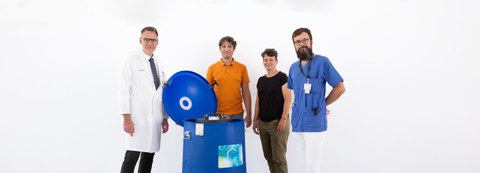Sep 13, 2024
Dresden supports major clinical trial to reduce mortality in sepsis using cell-based therapies

From left to right: Prof Mario Rüdiger, Dr Daniel Freund, Nadine Münch, Dr Marius A. Möbius.
TUD Dresden University of Technology (TU Dresden) and University Medicine Dresden are supporting an international Phase II clinical trial in Canada to investigate the efficacy of mesenchymal stem cells (MSCs) in reducing mortality in sepsis patients. Nearly 300 adult patients suffering from septic shock are taking part in this clinical trial, which is investigating whether MSCs modulate the immune response and reduce mortality in this acute life-threatening disease.
Sepsis is a common and extremely dangerous reaction of the body to an infection in which the immune system overreacts and damages its own tissue. On average, one in three patients does not survive this disease, and around 10 million people worldwide die every year as a result of sepsis. Even if patients manage to survive thanks to modern intensive care, many of them continue to suffer from severe, long-term health issues. So far, there are no effective treatment options for sepsis, which underlines the urgent need for novel, innovative treatment approaches. The current clinical trial in Canada is therefore investigating whether the intravenous use of MSCs reduces mortality and long-term health issues in sepsis patients.
Innovation comes from Dresden: Patented procedure to produce cells
Desacell, the MSC-based therapeutic drug tested in the clinical trial, comes from donated umbilical cords of healthy newborns born at the University Hospital Dresden (UKD). After donation, the cells are isolated using a protocol developed and patented at TU Dresden, and then processed in pharmaceutical purity rooms for clinical use as a drug trial. The protocol was developed under the direction of Dr. Marius A. Möbius and is the first to enable the production of particularly young, high-quality MSCs from umbilical cord tissue in doses sufficient for adults.
The close scientific collaboration between TU Dresden, the UKD and the Ottawa Hospital Research Institute (OHRI) in Canada plays a pivotal role in this process. Following extensive testing, the cells are frozen according to a special procedure and transported to Canada, where they are thawed and administered at the patient's bedside. The innovative technology and strict production standards from Dresden ensure the safety and quality of the MSCs.
SaxoCell and the future of cell therapy
The project is part of the SaxoCell Cluster4Future, which is funded by the German Federal Ministry of Education and Research. SaxoCell strives to establish an innovative cell therapy industry in Saxony, and has recently been able to acquire millions in follow-up funding. SaxoCell promotes the advancement of cell production technologies and strengthens clinical research. Under the leadership of Prof. Mario Rüdiger, the team headed by Dr. Freund and Dr. Möbius continues to work intensively on optimizing MSC production processes and developing new cell-based drug platforms in order to further increase the availability and applicability of these promising therapies.
Potential and future prospects
The results of the clinical trial could pave the way for completely new, cell-based therapy options for treating sepsis and bring about both a significant reduction in the mortality rate and an improvement in the quality of life of those affected worldwide. Moreover, the clinical trial could open up the path for using the MSC-based therapeutic drug Desacell in other medical indications, which demonstrates the potential of this innovative therapeutic approach.
About the clinical trial
The UC-CISS II clinical trial is led by Prof. Lauralyn McIntyre at the Ottawa Hospital Research Institute (OHRI) in Ontario, Canada, and is investigating nearly 300 adult patients with sepsis treated at 10 major Canadian hospitals. The MSC-based therapeutic drug Desacell, manufactured in Dresden, is shipped to Canada under ultra-low temperature and in special containers, where it can be stored until needed and then administered directly to patients in the intensive care unit. The researchers hope that the use of Desacell can modulate the immune response in sepsis and significantly improve patients' chances of survival.
Prof. Mario Rüdiger, Director of the Center for Feto/Neonatal Health at the UKD and TU Dresden, summarizes: "Our research aims to improve sepsis patients' chances to survive and their quality of life. This clinical trial is an invaluable step towards a novel therapeutic approach that could help many patients worldwide."
Tino Hammer, Managing Director of MDTB Cells, adds: "The clinical trial shows how universities and companies in Saxony are creating real prospects for critically ill patients thanks to local networking and global cooperation. The cell treatment used here is a prime example of the successful implementation of an idea from basic research through production development to actual clinical application.” The company, which was spun off from TU Dresden, is providing significant support for the clinical trial.
Contact:
Dr. med. Marius A. Möbius
Phone: +49 351 458 11898
www.ukdd.de/fetoneozentrum
